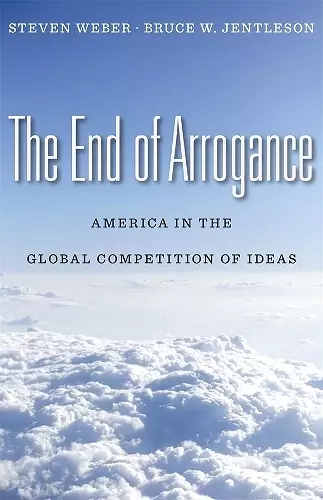The End of Arrogance
America in the Global Competition of Ideas
Bruce W Jentleson author Steven Weber author
Format:Hardback
Publisher:Harvard University Press
Published:30th Oct '10
Currently unavailable, and unfortunately no date known when it will be back

Weber and Jentleson put forward a powerful and provocative view of the coming frontiers for foreign policy - a global competition of ideas. Their arguments pose the right challenge to governments, corporations, and NGOs operating on a global stage, and provide practical advice for what to do about it. -- Janice Stein, Director, Munk School of Global Affairs, University of Toronto
Free-market capitalism, hegemony, Western culture, peace, and democracy—ideas that shaped world politics in the 20th century and underpinned American foreign policy—have lost their strength. Hegemony (benign or otherwise) is no longer a choice. The authors argue that in the 21st century the U.S. must rely on strategy, make trade-offs, and compete.
Free-market capitalism, hegemony, Western culture, peace, and democracy—the ideas that shaped world politics in the twentieth century and underpinned American foreign policy—have lost a good deal of their strength. Authority is now more contested and power more diffuse. Hegemony (benign or otherwise) is no longer a choice, not for the United States, for China, or for anyone else.
Steven Weber and Bruce Jentleson are not declinists, but they argue that the United States must take a different stance toward the rest of the world in this, the twenty-first century. Now that we can’t dominate others, we must rely on strategy, making trade-offs and focusing our efforts. And they do not mean military strategy, such as “the global war on terror.” Rather, we must compete in the global marketplace of ideas—with state-directed capitalism, with charismatic authoritarian leaders, with jihadism. In politics, ideas and influence are now critical currency.
At the core of our efforts must be a new conception of the world order based on mutuality, and of a just society that inspires and embraces people around the world.
In this little book, two leading scholars offer a manifesto for U.S. leadership in a post-Western international system… Acknowledging that no country has a monopoly on good ideas, the book makes a good case that the United States needs to recast the way it talks about its role in the world. -- G. John Ikenberry * Foreign Affairs *
The End of Arrogance makes a strong case for the end of the hegemony of American ideas in the foreign-policy sphere, examines what a more complex and diverse set of influences could create in terms of a future world order, and offers some important advice on how America can keep up in a more competitive world. -- Elizabeth Dickinson * Foreign Policy blog *
Dazzling. -- Ronald Brownstein * National Journal *
Weber and Jentleson put forward a powerful and provocative view of the coming frontiers for foreign policy—a global competition of ideas. Their arguments pose the right challenge to governments, corporations, and NGOs operating on a global stage, and provide practical advice for what to do about it. -- Janice Stein, Director, Munk School of Global Affairs, University of Toronto
- Nominated for Lionel Gelber Prize 2011
ISBN: 9780674058187
Dimensions: unknown
Weight: unknown
224 pages